Is a Veiled Chameleon in the Reptile Family
Chameleon Facts
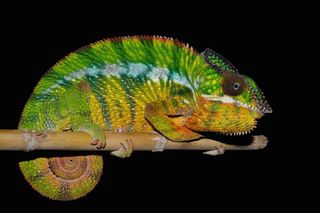
Chameleons are reptiles that are part of the iguana suborder. These colorful lizards are known every bit one of the few animals that can modify skin colour. However, it is a misconception that chameleons alter colors to match their surroundings.
Size
According to the Integrated Taxonomic Information System (ITIS), there are 171 species of chameleons. With then many different species, there are many different sizes.
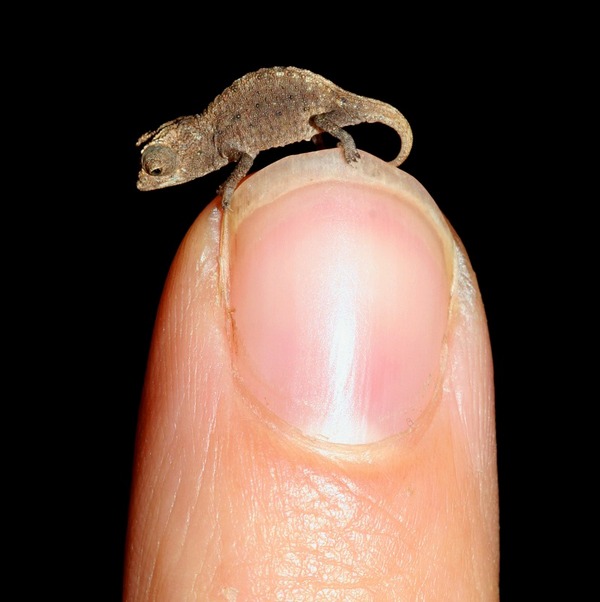
The largest chameleon is the Parson's chameleon, according to Encyclopedia Britannica. Information technology tin can grow up to 27 inches (69.v centimeters) long. The Madagascan, also known equally the Oustalet's chameleon, is too very large and grows up to 23 inches (60 cm) long.
The smallest chameleon has a special distinction. It is also one of the smallest vertebrates e'er discovered. The leaf chameleon grows to merely 0.v inches (16 millimeters) and can sit down comfortably on the head of a match.
Unlike other animals, chameleons proceed to abound throughout their lives. As their former pare gets as well small, they will shed it in bits and pieces, dissimilar to snakes that shed their skin all at once.
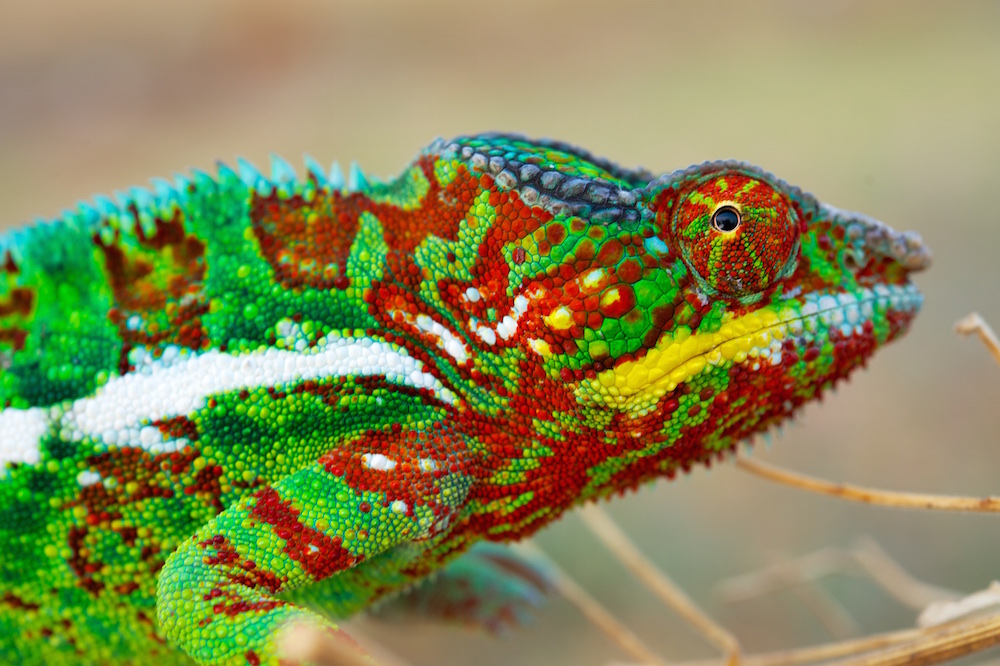
Peel of many colors
Changing skin color is an important part of communication amidst chameleons. Co-ordinate to the San Diego Zoo, a chameleon'southward skin changes colors in response to its emotions, such equally acrimony or fear, changes in low-cal, temperature or humidity.
The brighter the colour, the more ascendant the male is, and the more bonny he is to females. A submissive male is ordinarily brownish or gray. Females utilize their colors to accept or refuse a suitor, and their color can as well point that she is pregnant.
A new report has found that chameleons can rapidly change color by adjusting special cells, chosen iridophore cells, in each layer. The chameleons can change the structural arrangement of the upper cell layer past relaxing or exciting the skin, which leads to a change in colour, researchers plant. [Photos: How Chameleons Change Colour]
Habitat
Chameleons alive in Madagascar, Africa, Kingdom of spain, Portugal and Asia in rain forests, savannas, semi-deserts and steppes, according to the San Diego Zoo. They typically stay in copse or bushes, though some species do live on the ground. For case, the horned leafage chameleon lives in dead leaves on forest floors co-ordinate to the National Wild animals Federation. [Photos: 11 Colorful Chameleons of Madagascar]
Habits
Nigh chameleons have a prehensile tail that they use to wrap effectually tree branches. Their hands and feet have large toes that help them cling to branches.
Besides changing skin colour, chameleons have some other feature that no other animals take. Their eyes can movement independently of each other, enabling them to await in two different directions at one time. Chameleons have a full 360-caste view and can focus their eyes quickly and enlarge what they are looking at similar a camera lens.
Chameleons are loners. In fact, about of the time females don't desire males to fifty-fifty come about them. During the rare moments when the female is willing to be touched, the male person will arroyo for mating. A brighter colored male person chameleon is more than likely to convince a female to mate than a duller colored male.
Diet
Chameleons eat insects and birds. To catch their prey, they creep along very slowly. Once the prey is in achieve, their suction cup natural language shoots out and sticks to the insect. Their tongues can be every bit twice as long as their bodies when stretched out to grab prey, co-ordinate to Encyclopedia Britannica. The insect is fatigued back into the lizard's oral fissure to be digested by strong stomach acids.
Water is very important to chameleon growth and wellness. They either slurp water up using their tongues or the inhale it.
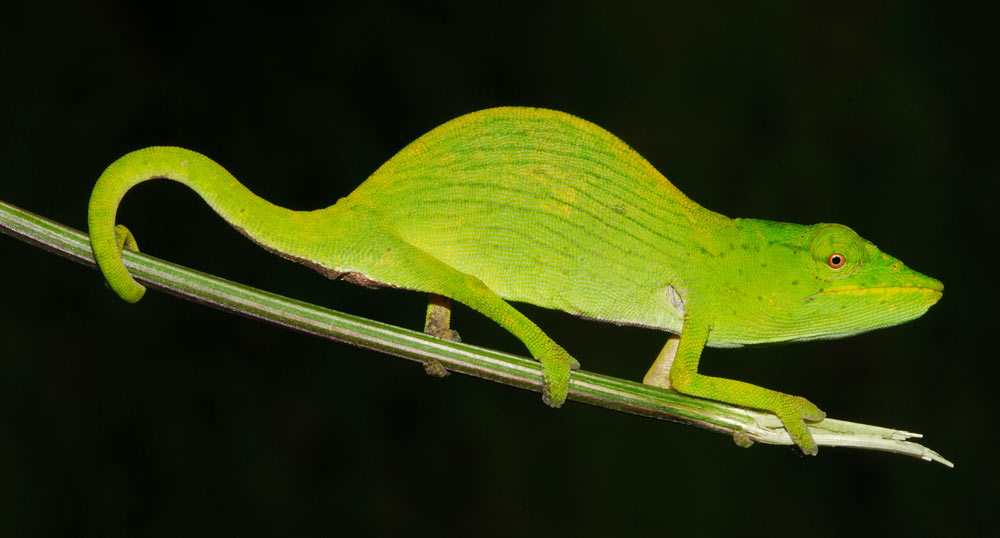
Offspring
Chameleons are unlike from many reptiles considering some of the species, like the Jackson's chameleon, have live births. These species tin requite nascency to eight to 30 immature at one fourth dimension after a gestation of iv to six months. While the immature are born live instead of in an egg, they started as an egg. These mothers incubate the eggs, minus a shell, inside of her body instead of laying them in a nest.
Other chameleon species lay eggs that accept an incubation flow of four to 24 months, depending on species, co-ordinate to the San Diego Zoo. The size of the chameleon predicts how many eggs she volition lay. Small chameleon species lay two to four eggs while larger chameleons lay 80 to 100 eggs at i time.
No matter what species, chameleons go mature at 1 to 2 years of historic period. The exception is the Madagascan chameleon. It has been labeled as the vertebrate with the globe's shortest life span, according to Encyclopedia Britannica. Their eggs hatch in Nov, the young go adults in January, they lay eggs in February, and and then the entire developed population perishes after a lifespan of just three months.
Classification/taxonomy
The taxonomy of chameleons, according to the ITIS, is:
- Kingdom: Animalia
- Subkingdom: Bilateria
- Infrakingdom: Deuterostomia
- Phylum: Chordata
- Subphylum: Vertebrata
- Infraphylum: Gnathostomata
- Superclass: Tetrapoda
- Grade: Reptilia
- Order: Squamata
- Suborder: Iguania
- Family: Chamaeleonidae
- Subfamilies: Brookesiinae, Chamaeleoninae
- Genera & species: Within the two subfamilies are nine genera and 171 species. A few examples —Calumma parsonii (Parson'southward chameleon),Furcifer oustaleti (Oustalet's chameleon),Brookesia minima (pygmy leafage chameleon),Chameleo jacksonii (Jackson's chameleon)
Conservation status
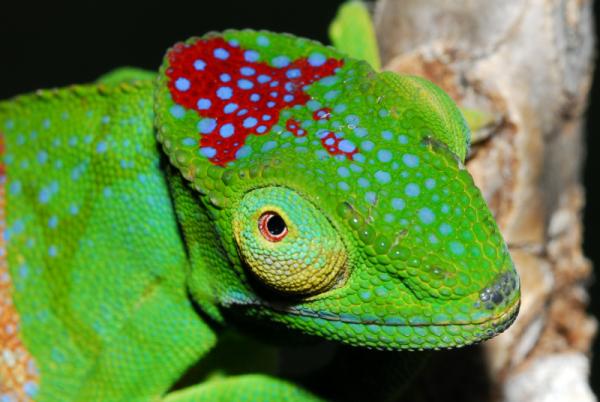
According to International Matrimony for Conservation of Nature's Cerise List of Threatened Species, many species of chameleon are endangered. Some species that are considered in danger of extinction are the tiger chameleon, Elandsberg dwarf chameleon, Namoroka leaf chameleon and the Decary's leaf chameleon.
Additional resources
- National Wild animals Federation: Chameleons
- Smithsonian National Zoological Park: Veiled Chameleon
- The Chameleon Handbook
Source: https://www.livescience.com/51061-chameleon.html#:~:text=Chameleons%20are%20reptiles%20that%20are,colors%20to%20match%20their%20surroundings.

0 Response to "Is a Veiled Chameleon in the Reptile Family"
Postar um comentário